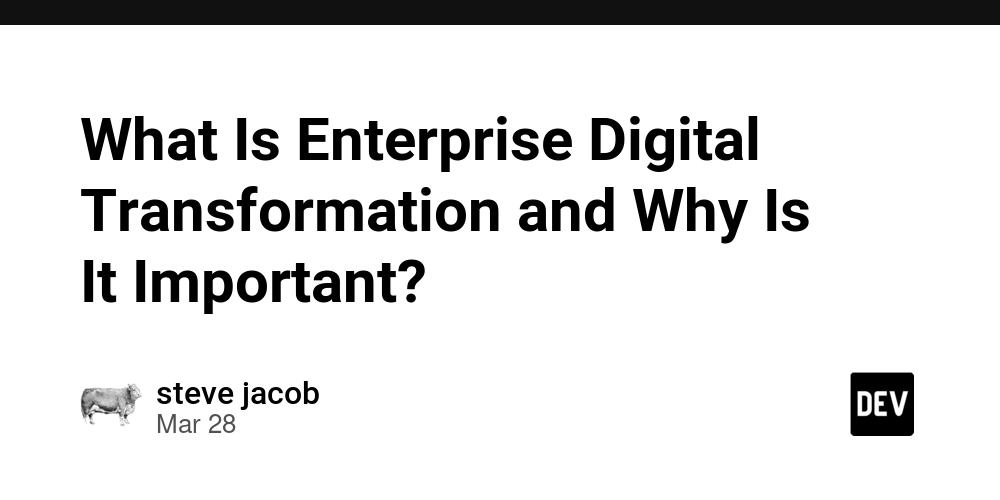What Is Enterprise Digital Transformation and Why Is It Important?
Introduction Enterprise digital transformation is more than just a buzzword—it’s a fundamental shift in how businesses operate, leveraging technology to drive innovation, efficiency, and competitiveness. In today’s fast-paced digital landscape, organizations must embrace digital transformation to stay ahead. This blog explores what enterprise digital transformation entails, its key components, and why it is crucial for modern businesses. What Is Enterprise Digital Transformation? Enterprise digital transformation refers to the integration of digital technology into all aspects of a business, fundamentally changing how it operates and delivers value to customers. It involves rethinking business models, processes, and customer experiences by leveraging modern technologies such as cloud computing, artificial intelligence (AI), big data, the Internet of Things (IoT), and automation. Key Components of Enterprise Digital Transformation Technology Adoption Businesses must adopt cutting-edge technologies, including cloud computing, AI, blockchain, and IoT, to improve efficiency and customer experience. Data-Driven Decision-Making Leveraging big data and analytics helps businesses make informed decisions, enhance customer insights, and optimize operations. Customer-Centric Approach Enhancing customer experience through personalized services, seamless interactions, and omnichannel engagement is a key driver of digital transformation. Agile and Scalable Operations Digital transformation promotes flexibility and scalability, enabling businesses to adapt quickly to market changes and customer demands. Cybersecurity and Compliance With increased reliance on digital platforms, organizations must prioritize cybersecurity, data privacy, and regulatory compliance. Workforce Digital Upskilling Training employees in digital tools and technologies ensures a smooth transition and maximizes the benefits of digital transformation. Why Is Enterprise Digital Transformation Important? Enhanced Efficiency and Productivity Automation and AI-driven processes reduce manual work, optimize workflows, and improve overall productivity. Improved Customer Experience Digital tools enable businesses to offer personalized experiences, streamline customer interactions, and boost satisfaction. Competitive Advantage Companies that embrace digital transformation stay ahead of competitors by leveraging innovative technologies and agile methodologies. Cost Savings Cloud computing and automation reduce operational costs while increasing efficiency and scalability. Data-Driven Insights Access to real-time data analytics empowers businesses to make smarter decisions, anticipate market trends, and optimize performance. Business Resilience and Adaptability A digitally transformed enterprise is more resilient to disruptions, such as economic downturns or global crises, ensuring continuity and stability. Conclusion Enterprise digital transformation is no longer optional—it’s a necessity for businesses seeking sustainable growth and success in the digital era. By embracing technology, data-driven strategies, and customer-centric approaches, organizations can unlock new opportunities, improve operational efficiency, and stay ahead in an increasingly competitive marketplace. Investing in digital transformation today will shape the future of businesses for years to come.

Introduction
Enterprise digital transformation is more than just a buzzword—it’s a fundamental shift in how businesses operate, leveraging technology to drive innovation, efficiency, and competitiveness. In today’s fast-paced digital landscape, organizations must embrace digital transformation to stay ahead. This blog explores what enterprise digital transformation entails, its key components, and why it is crucial for modern businesses.
What Is Enterprise Digital Transformation?
Enterprise digital transformation refers to the integration of digital technology into all aspects of a business, fundamentally changing how it operates and delivers value to customers. It involves rethinking business models, processes, and customer experiences by leveraging modern technologies such as cloud computing, artificial intelligence (AI), big data, the Internet of Things (IoT), and automation.
Key Components of Enterprise Digital Transformation
- Technology Adoption Businesses must adopt cutting-edge technologies, including cloud computing, AI, blockchain, and IoT, to improve efficiency and customer experience.
- Data-Driven Decision-Making Leveraging big data and analytics helps businesses make informed decisions, enhance customer insights, and optimize operations.
- Customer-Centric Approach Enhancing customer experience through personalized services, seamless interactions, and omnichannel engagement is a key driver of digital transformation.
- Agile and Scalable Operations Digital transformation promotes flexibility and scalability, enabling businesses to adapt quickly to market changes and customer demands.
- Cybersecurity and Compliance With increased reliance on digital platforms, organizations must prioritize cybersecurity, data privacy, and regulatory compliance.
- Workforce Digital Upskilling Training employees in digital tools and technologies ensures a smooth transition and maximizes the benefits of digital transformation. Why Is Enterprise Digital Transformation Important?
- Enhanced Efficiency and Productivity Automation and AI-driven processes reduce manual work, optimize workflows, and improve overall productivity.
- Improved Customer Experience Digital tools enable businesses to offer personalized experiences, streamline customer interactions, and boost satisfaction.
- Competitive Advantage Companies that embrace digital transformation stay ahead of competitors by leveraging innovative technologies and agile methodologies.
- Cost Savings Cloud computing and automation reduce operational costs while increasing efficiency and scalability.
- Data-Driven Insights Access to real-time data analytics empowers businesses to make smarter decisions, anticipate market trends, and optimize performance.
- Business Resilience and Adaptability A digitally transformed enterprise is more resilient to disruptions, such as economic downturns or global crises, ensuring continuity and stability. Conclusion Enterprise digital transformation is no longer optional—it’s a necessity for businesses seeking sustainable growth and success in the digital era. By embracing technology, data-driven strategies, and customer-centric approaches, organizations can unlock new opportunities, improve operational efficiency, and stay ahead in an increasingly competitive marketplace. Investing in digital transformation today will shape the future of businesses for years to come.












































































